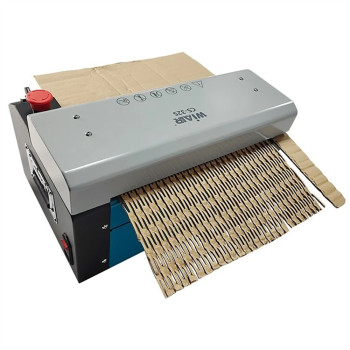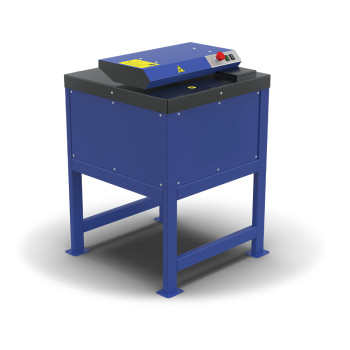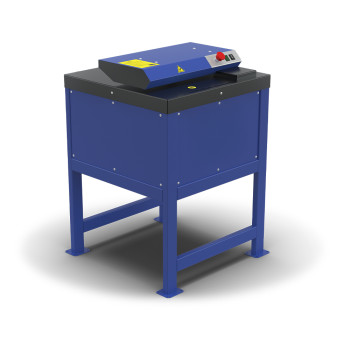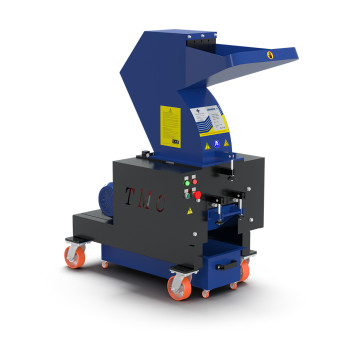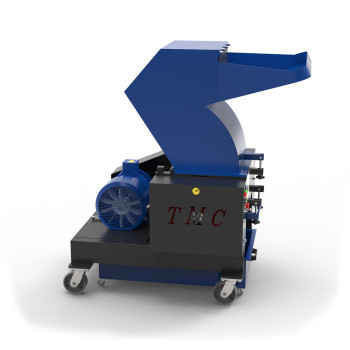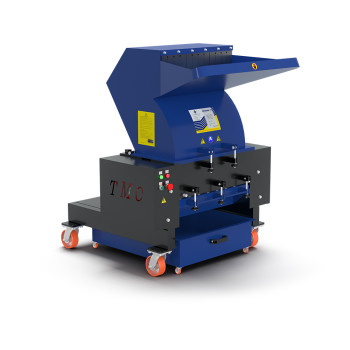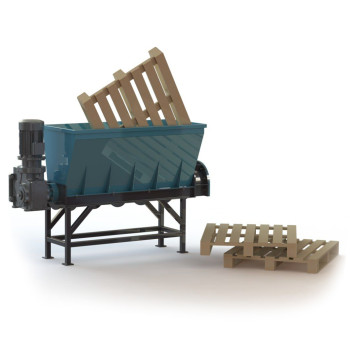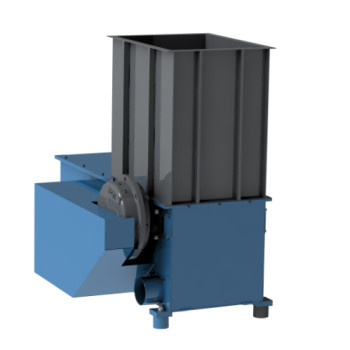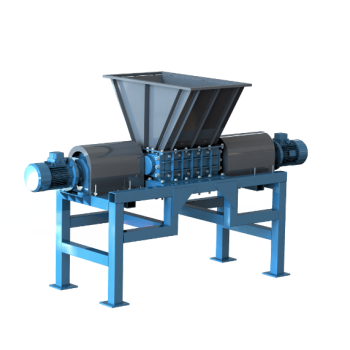Kod produktu: CS-325
6 900.00zł
Dostępność: W magazynie
Niszczarka CS-325 do tektury to urządzenie przeznaczone dla firm wykorzystujących odpady kartonowe j..
Kod produktu: NT-2
8 920.00zł
Dostępność: W magazynie
Niszczarka do kartonu NT-2 – Ekologiczne rozwiązanie dla firm NT-2 to kompaktowe, wydajne urządzeni..
Kod produktu: NT-5
11 970.00zł
Dostępność: W magazynie
Rozdrabniacz kartonu NT-5 to profesjonalne urządzenie przeznaczone do efektywnego przetwarzania zuży..
Kod produktu: Grindex-4
19 900.00zł
Dostępność: W magazynie
Rozdrabniacz udarowy do plastiku Grindex-4 - wydajne i kompaktowe urządzenie zaprojektowane do skute..
Kod produktu: Grindex-7
23 200.00zł
Dostępność: W magazynie
Rozdrabniacz do plastiku Grindex-7 jest przemysłowym urządzeniem udarowym, które pozwala na rozdrabn..
Kod produktu: Grindex-11
34 880.00zł
Dostępność: W magazynie
Rozdrabniacz udarowy do plastiku Grindex-11 - to wysokowydajne urządzenie przeznaczone do mechaniczn..
Kod produktu: SB-10
71 445.00zł
Dostępność: W magazynie
Rozdrabniacz do palet SB-10 to nowoczesne i wydajne urządzenie, które znacząco przyspiesza oraz upra..
Kod produktu: RJ-600
97 650.00zł
Dostępność: W magazynie
Jednorotorowy shredder RJ-600 to sprawdzony i wszechstronny shredder przeznaczony do rozdrabniania o..
Kod produktu: EZ-20
163 530.00zł
Dostępność: W magazynie
EZ-20 to wyjątkowo mocny dwuwałowy rozdrabniacz przeznaczony do drewna oraz wielu innych materiałów,..
Kod produktu: EZ-40
341 550.00zł
Dostępność: W magazynie
Dwuwałowy rozdrabniacz EZ-40 to niezwykle wydajny dwuwałowy rozdrabniacz przeznaczony do drewna oraz..
Szukaj po kategorii - tagi produktów:
shredder do papieru rozdrabniacz do palet allegro rozdrabniacz dwuwałowy plastic shredder paper shredder shredder maschine shredder rozdrabniacz do odpadów rozdrabniacz do szkła rozdrabniacz do tworzyw sztucznych rozdrabniacz do makulatury rozdrabniacz do palet kruszarka dwuwałowa do drewna rozdrabniacz do odpadów drewnianych Rozdrabniacz SB-10 EZ 40 Rozdrabniacz do palet SB-10 Rozdrabniacz jednowałowy owijarka do palet owijarki do palet półautomatyczne owijarki do palet automatyczna owijarka do palet EZ 20 rozdrabniacze gwarancja urządzenia recykling materiałów materiały kruszarka do plastiku Grindex RJ-600 recykling owijarka talerzowa

Rozdrabniacze do odpadów, shreddery, niszczarki
Rozdrabniacze do odpadów, shreddery i niszczarki to urządzenia, które powszechnie wykorzystywane są w przemyśle do recyklingu, jak i przetwarzania różnych materiałów. Używane są w firmach przetwarzających odpady, zakładach produkcyjnych i podmiotach zajmujących się recyklingiem materiałów. Dzięki rozdrobnieniu na mniejsze cząstki można odzyskać surowce, poddać dalszemu przetwarzaniu lub poddać bezpiecznej utylizacji. W naszej ofercie TechnoMaszBud znajdziesz wydajne i trwałe rozdrabniacze, dzięki którym możliwe jest przetwarzanie papieru, drewna, szkła, tworzyw sztucznych, a także odpadów wielomateriałowych.
Kiedy warto zainwestować w rozdrabniacz?
Nowoczesne rozdrabniacze do odpadów to maszyny zaprojektowane z myślą o intensywnej pracy w zakładach przemysłowych. W zależności od modelu, jego parametrów i konstrukcji urządzenia tego typu mogą służyć jako:
- rozdrabniacz do makulatury – przygotowywanie papierów i gazet do recyklingu,
- shredder do papieru (paper shredder) – do niszczenia makulatury i dokumentów,
- rozdrabniacz do plastiku (plastic shredder) – przetwarzanie tworzyw sztucznych,
- rozdrabniacz do odpadów drewnianych – częstym zakupem jest kruszarka dwuwałowa do drewna,
- rozdrabniacz do palet – odpowiedni do zakładów drzewnych czy produkcji pelletu i brykietu,
- rozdrabniacz do szkła – wykorzystywany do recyklingu i w zakładach przemysłowych,
- rozdrabniacz do tworzyw sztucznych – odpowiedni do zakładów przetwórczych, produkcji granulatu czy recyklingu.
Inwestycja w shreddery i niszczarki to możliwość wydajnego przygotowywania odpadów, jak i ułatwienie całego procesu produkcyjnego oraz szansa na optymalizację kosztów składowania i transportu materiału.
Jakie niszczarki i rozdrabniacze do odpadów znajdziesz w naszej ofercie?
W TechnoMaszBud dostępne są różne rodzaje rozdrabniaczy, które można dopasować do indywidualnych potrzeb technologicznych, jak i rodzaju przetwarzanego materiału czy intensywności pracy. Dostępny jest m.in.:
- rozdrabniacz jednowałowy – model uniwersalny, odpowiedni do rozdrabniania materiałów jednorodnych, takich jak papier, plastik czy drewno. Gwarantuje wysoki poziom precyzji rozdrabniania i kontrolę całego procesu,
- rozdrabniacz dwuwałowy – zarówno rozdrabniacz dwuwałowy, jak i kruszarka dwuwałowa do drewna są właściwe dla cięższych zastosowań, takich jak rozdrabnianie palet, odpadów przemysłowych i drewnianych oraz innych twardych, oraz dużych elementów,
- specjalistyczne shreddery i niszczarki – to urządzenia takie jak kruszarka do plastiku Grindex, plastic shredder czy shredder do papieru. Są idealne do zastosowań specjalistycznych i procesów wysoko wyspecjalizowanych.
W naszej ofercie znajdują się również poszukiwane, chętnie wybierane i cenione modele rozdrabniaczy i niszczarek przemysłowych. To takie modele jak:
- EZ 40 – shredder uniwersalny do różnego rodzaju odpadów,
- rozdrabniacz do palet SB-10 – rozdrabniacz kompaktowy do intensywnego przetwarzania palet, jak i drewna,
- RJ-600 – shredder przemysłowy do wydajnego użytkowania,
- kruszarka do plastiku Grindex – urządzenie specjalistyczne do różnych tworzyw sztucznych.
Wszystkie oferowane urządzenia działają w oparciu o najwyższe normy i zasady bezpieczeństwa.
Rozdrabniacze, niszczarki i shreddery TechnoMaszBud – co wyróżnia nasze urządzenia?
Rozdrabniacze do odpadów i różnych materiałów dostępne w naszej ofercie to sprzęty najwyższej jakości. Dzięki zdecydowaniu się na proponowane modele zyskujesz:
- trwałą konstrukcję sprzętu i wysoką wydajność pracy maszyny,
- sprawdzone i solidne maszyny przemysłowe,
- możliwość dopasowania rozdrabniacza do konkretnego typu materiałów,
- gwarancję producenta i serwis techniczny,
- ułatwienieprocesu recyklingu materiałów.
Rozdrabniacze oferowane w TechnoMaszBud to odpowiednie urządzenia zarówno do małych zakładów, jak i do dużych instalacji przemysłowych i firm działających na większą skalę.
Zapraszamy do szczegółowego zapoznania się z naszą ofertą rozdrabniaczy do odpadów, shredderów i niszczarek. Chętnie odpowiemy na wszystkie pytania oraz pomożemy w dobraniu odpowiedniego urządzenia w odniesieniu do indywidualnych potrzeb, branży, jak i materiału.
Najczęściej zadawane pytania – Rozdrabniacze, niszczarki, shreddery
Czym różni się rozdrabniacz jednowałowy od dwuwałowego?
Rozdrabniacz jednowałowy sprawdza się głównie przy rozdrabnianiu jednorodnych oraz lżejszych materiałów, takich jak papier, plastik oraz drobne odpady drewniane. Zapewnia kontrolowany proces cięcia, a także równomierną frakcję. Rozdrabniacz dwuwałowy będzie odpowiedni do bardziej wymagających i cięższych zastosowań. To urządzenie właściwe do grubych elementów drewnianych palet, a także odpadów wielkogabarytowych. Dzięki dwóm wałom roboczym może pracować stabilnie nawet przy bardzo twardych materiałach.
Do jakich materiałów można stosować rozdrabniacze?
W zależności od zastosowanej technologii i modelu rozdrabniacz do odpadów może być wykorzystany do różnych materiałów. Sprawdza się przy rozdrabnianiu makulatury, papieru, drewna, tworzyw sztucznych, palet, ale też szkła i odpadów przemysłowych. Właściwie dobrany shredder czy rozdrabniacz dwuwałowy będzie odpowiedni też w procesie recyklingu. Zmniejszy objętość materiału oraz ułatwi transport czy magazynowanie.
Czy rozdrabniacze w TechnoMaszBud objęte są gwarancją?
Wszystkie rozdrabniacze, niszczarki i shreddery dostępne w ofercie TechnoMaszBud objęte są gwarancją. Dzięki temu nabywca zyskuje bezpieczeństwo i dostęp do niezawodnego urządzenia, a także pełne wsparcie po zakupie sprzętu. Gwarancją objęte są zarówno kwestie konstrukcyjne, jak i mechaniczne. To również pomoc w eksploatowaniu oraz serwisowaniu rozdrabniaczy. Zapewniamy też profesjonalne doradztwo podczas wyboru i zakupu maszyn.
Czy shreddery można stosować w recyklingu przemysłowym?
Zarówno paper shredder, plastic shredder, jak i każdy inny model shreddera i rozdrabniacza dostępny w ofercie TechnoMaszBud zaprojektowany został z myślą o wykorzystaniu na skalę przemysłową. Sprzęty mogą pracować przy dużych obciążeniach, w trybie ciągłym i gwarantują wysoką wydajność.

